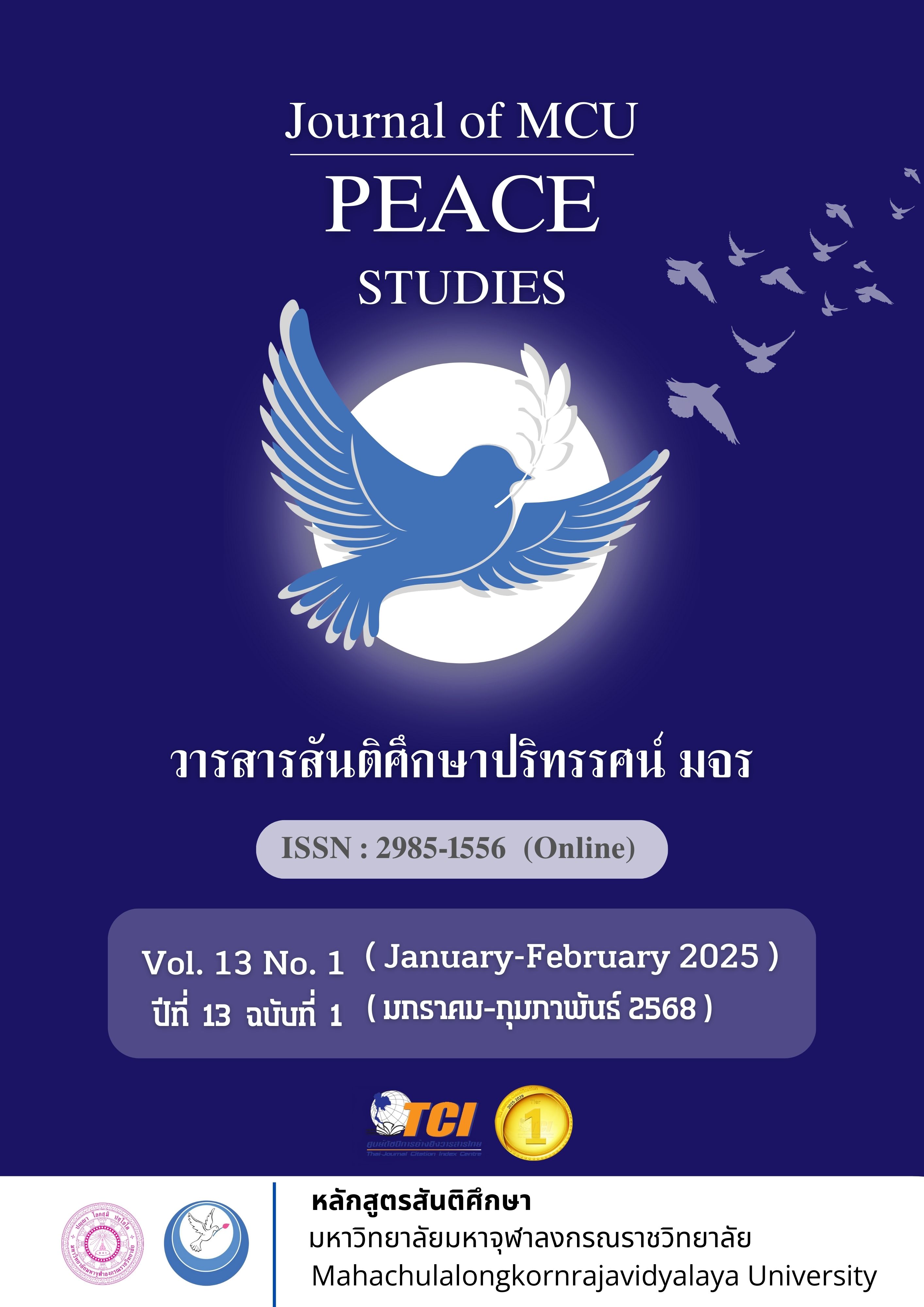An Application of Mindfulness for Effective Student Services: A Case Study of Peace Studies Program’s Mahachulalongkornrajavidyalaya University
Main Article Content
Abstract
The study consisted of the following objectives: 1) to investigate the context, problems, needs, and theories of providing services to students based on modern science; 2) to examine the principle of mindfulness based on Theravada Buddhism; and 3) to propose an application of mindfulness to provide effective student services in the Peace Studies program. A qualitative research method was used in the study, in the form of a field study, which involved in-depth interviews with 24 key informants, including 13 service recipients, 6 service providers and 5 graduates. The study findings were analyzed using the inductive method.
The following findings were found: 1) According to the study, officers at the Peace Studies program nowadays provide services to a large number of students, both monks and lay people, making it difficult to provide thorough service. As few mistakes as possible must be made in the provision of services to students. Officers must be mindful and determined in the performance of their duties, communication, coordination, and preparation of documents pertaining to students. Services also include the use of technology for communication, such as the Line app, which must be handled mindfully in order to satisfy students. 2) Sati refers to mindfulness and carelessness. Mindfulness stimulates and controls behaviors, reminds individuals to be prepared, not to be reckless, and to focus their minds on thee current responsibilities. Additionally, it also monitors individuals not to be forgetful or absentminded. Mindfulness serves as a spiritual anchor, guiding individuals in cultivating other Dhamma principles in order to be awakened. It serves as a shield against problems forgetfulness, and restlessness, allowing individuals to be one-pointed and happy in the present moment. Officers in the Peace Studies program will thus be less greedy in their services, less exploitative, less vengeful, and more diligent in their duties, resulting in wisdom. 3) The application of mindfulness helps to provide more effective services to students in the Peace Studies program, which can be summarized in the following 8 components: (1) Using mindfulness to prevent forgetfulness or absent-mindedness, but instead taking responsibility in providing services to students; (2) Using mindfulness as a spiritual anchor, so that officers have a strong faith in providing services to students, and not having any resentment against students; (3) Using mindfulness to be awaken so that officers can provide services to students with enthusiasm and facilitate them quickly; (4) Using mindfulness in communication to maintain positive relationships and avoid bribes; (5) Using mindfulness to be awaken so that officers can provide services to students without considering the potential benefits or advantages; (6) Using mindfulness in expression with a smile and joyful attitude when providing services to students; (7) Using mindfulness to resolutely perform good deeds, cultivate morality, and make an effort to provide transparent services to students; and (8) Using mindfulness to be content in providing services to students in the present moment.
Article Details

This work is licensed under a Creative Commons Attribution-NonCommercial-NoDerivatives 4.0 International License.
Views and opinions expressed in the articles published by The Journal of MCU Peace Studies, are of responsibility by such authors but not the editors and do not necessarily reflect those of the editors.
References
Chanlun, J. (2020). Information Behavior during COVID-19 Pandemic Era. TLA Bulletin, 64(2), 36-49.
Charoensiri, S., Wongsuwan, Ch., Suwanlert, Ch., & Siriwong, W. (2018). The Model to Retrieve Electronic Information via the Digital 4.0 “Cloudbrarian” Service. Pulinet Journal, 5(1), 223-231.
Horsaengchai, B. (2018). A Trend for Developing Peace Engineers Curriculum in Integrated Buddhist Perspective: A Case Study of the Doctor of Philosophy Program in Peace Studies Mahachulalongkornrajavidyalaya University. (Doctoral Dissertation). Mahachulalongkornrajavidyalaya University. Ayutthaya.
Kaewchaithen, P. (2018). Guidelines for Arranging Lifelong Learning Resources in Neighborhood Area of Chulalongkorn University to Promote the Youths to Be Lifelong Learners. (Doctoral Dissertation). Chulalongkorn University. Bangkok.
Kaewsowatana, N., & Phramaha Hansa Dhammahaso. (2021). The Developmental Process of Mindfulness-Based Learning: A Case Study Upper Primary School at Ban Tha Khoi Nang School Sisaket Provice. Journal of MCU Peace Studies, 9(3), 1015-1027.
Mugsudachaisiri, N. (2019). A Development of Master of Arts Program in Mindfulness Studies (International Program) of International Buddhist Studies College, Mahachulalongkornrajavidyalaya University. (Doctoral Dissertation). Mahachulalongkornrajavidyalaya University. Ayutthaya.
Phra Apichai Abhivaddhano. (2016). An Application of Garavasadhamma for Enhancing Peaceful Families. Journal of MCU Peace Studies, 4(1), 174-187.
Phra Supakit Supanno, Iamsupasit, S., & Udomtamanupab, M. (2020). Effect of Mindfulness and Solving Problem Process to Stress and Learning Achievement of Students in Secondary School: Mueang District, Kanchanaburi Province. Journal of MCU Peace Studies, 8(2), 585-595.


